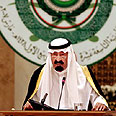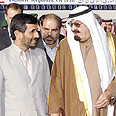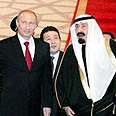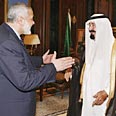



Report: Saudi Arabia turning its back on US
Washington Post reports Saudi king said no to White House gala without providing convincing explanation. During his speech at Riyadh summit, king slams 'illegal American occupation in Iraq.' Commentators: In light of disappointing reactions from Washington to Saudi initiative, Saudi Arabia is wooing Iran, Syria and Russia
Washington Post columnist Jim Hoagland revealed this week that Saudi King Abdullah cancelled a mid-April White House gala without providing a convincing explanation.
According to the report, Bandar bin Sultan, the Saudi national security adviser, flew to Washington last week to explain to US President George W. Bush that April 17 posed a scheduling problem.
But administration sources reported that Bush and his senior advisers were not convinced by Bandar's vagueness – especially since it followed Saudi decisions to seek common ground with Iran and the radicals of Hizbullah and Hamas instead of confronting them as part of Rice's proposed "realignment" of the Middle East into moderates and extremists.
Another proof of the crisis was expressed in the king's speech at the Arab League summit in Riyadh, in which he slammed the US occupation in Iraq.
Abdullah said in his speech that the American occupation was "illegal" and warned the Arab governments that if they did not overcome their differences, foreign elements such as the US would continue to dictate the region's policy.
This was the king's harshest criticism of the Iraq war.
Official US sources expressed their surprise over the remarks, and simultaneously tried to minimize the criticism and imply that there may have been a mistake in the translation.
State Department Spokesman Sean McCormack said that the US viewed Saudi Arabia as a courageous friend and ally, and praised its efforts to being about reconciliation in the Middle East and the good relations between the Saudi leadership and the Bush administration.
But it appears that the relations are not so good. Bush had planned a White House gala for the king to signify the president's high regard for an Arab monarch who is also a Bush family friend.
According to Hoagland, Abdullah's bowing out of the April 17 event is, in fact, one more warning sign that the Bush administration's downward spiral at home is undermining its ability to achieve its policy objectives abroad. Friends as well as foes see the need, or the chance, to distance themselves from the politically besieged Bush.
Saudis turning to the other side
According to commentators, the Saudis were furious over Washington's support of Israel's stance and failure to express more support for the Saudi initiatives, and have therefore begun looking for support in the other group, which Washington refers to as "the extreme axis."
According to Hoagland, Abdullah's reluctance to be seen socializing at the White House this spring reflects two related dynamics: A scampering back by the Saudis to their traditional caution in trying to balance regional forces, and their displeasure with negative US reaction to their decision to return to co-opting or placating foes.
Abdullah gave a warm welcome to Iranian President Mahmoud Ahmadinejad in Riyadh in early March, not long after the Saudis pressured Palestinian President Mahmoud Abbas into accepting a political accord that entrenches Hamas in an unwieldy coalition government with Abbas's Fatah movement, Hoagland wrote.
A few months ago, he said, Bandar was championing the confrontational "realignment" approach in Saudi family councils: Iran's power would be broken, the Syrians would have to give up hegemonic designs on Lebanon, etc.
Now the Saudi prince visits Tehran and Moscow regularly. He helped set the stage for the Palestinians' Mecca accord, which has caused Israel to reduce what little cooperation it felt it could extend to Abbas.
According to Hoagland, the Saudis, too, know how to read election returns. They see Bush swimming against a tide of scandal and stench that engulfs his most trusted aides. In the traditional Saudi worldview, this is a moment to hedge, not to indulge in the kind of leadership needed to break the Israeli-Palestinian deadlock or the deadly morass of Iraq.
The Saudis surprised us by going that far," explained one White House official in a comment that reached - and irritated - Saudi officials. So don't count on Abdullah to put new force behind his long-stalled Israeli-Palestinian peace initiative at the Arab summit scheduled this week in Riyadh, Hoagland wrote.
Rice had hoped the summit would provide a boost in her current proximity talks with Israeli and Palestinian officials, but she appears to have struck a dry well. "She is conducting crisis management, not grand diplomacy," a European official who talked to her recently said disappointedly.
Adds an admirer who tracks Rice's intentions and assessments in the Middle East: "Condi is doing everything she can. But she is dancing with a corpse that just keeps flopping over in another direction every time she tries to move it.
It appears that Jordan's King Abdullah is also distancing himself from the Bush administration. According to Hoagland, he has let the White House know that he can't make that state visit discussed for September and asked to delay the visit to 2008.
"The Saudis are telling the United States that it must listen to its allies, and not only impose its decisions on them and always accept Israel's stance," a Jordanian commentator told the New York Times.















